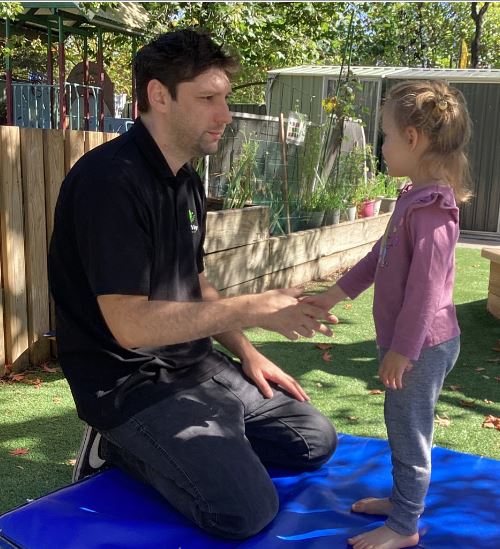By Gabby Millgate
Nature Pedagogy Leader
Summer is an abundant time at Woden Valley ELC and you are invited to the Community Garden, out the front of the service, to enjoy the flowers, beans, herbs and celery we have growing. And there’s so many benefits to spending time in this garden, to de-stress at the end of the day.

We call it also the Floriade Garden because we participate in Floriade Re-Imagine Program each year. This year we have taken special care to make this garden inviting for families to enjoy in summer.
I see this garden as a wonderful space to invite your child to enjoy with you, before getting in the car. An invitation to pick a pansy or some celery leaves for dinner can be a great way to help your child transition at the end of the day. It can give them a purpose and an opportunity for them to demonstrate knowledge and agency. Plus it feels good to bring something home from school to share.
How about some celery leaves for a soup or a pansy to put on your desert? Pansies are edible and are used in fancy restaurants, I’ve heard.

Why am I suggesting a quick or longer stop in our Floriade Garden at the end of the day?
Well, sometimes I have observed that children can resist a direct instruction to get their bag and leave their friends who are doing something fun. So, we’ve created a wonderful way to make them a better offer. “Would you like to choose a flower to pick and take home? Or maybe you can help me find a purple bean to have with our dinner.” - This type of invitation is an example of something I’ve seen resistant children respond to enthusiastically.

Even a short time spent in the garden can help them develop skills and give you both a reason to get in the car besides just - “get in the car!”
e.g. “We’re going to get in the car so we can take this flower or these herbs home for our dinner.”
How to pick the flowers?
A great skill we love to teach the children is to hold the plant with one hand and pull the bean or flower with the other (so we look after the plant and not yank it out of the ground-then it can keep making beans or flowers). This is one of the sustainable practices we will be teaching this year to the younger children and the older children might be able to demonstrate this skill to you.
Don’t worry if they get it wrong. As long as they don’t walk over our garden beds, let their interest in the garden spark your interest. It’s a great way to have a relaxed interaction and conversations with your child. It can be a ritual you establish together.
Maybe you will find a strawberry...

...or a snail eating a strawberry.
Maybe each day you could check on the development of our giant sunflowers that are about to burst into flower.

Maybe, you can pick some of our abundant lemon thyme, to make a tea or add to your Bolognaise.

Maybe you could take off your shoes and walk on our luxurious grass.
In Japan it’s called "Nature Bathing”.

Maybe, if you look carefully, you will find a 4 leaf clover, and notice that we’re so lucky to have a community and parent committee that supports children’s access to nature, in a garden created by the children of Woden Valley ELC, over the last 8 years.















